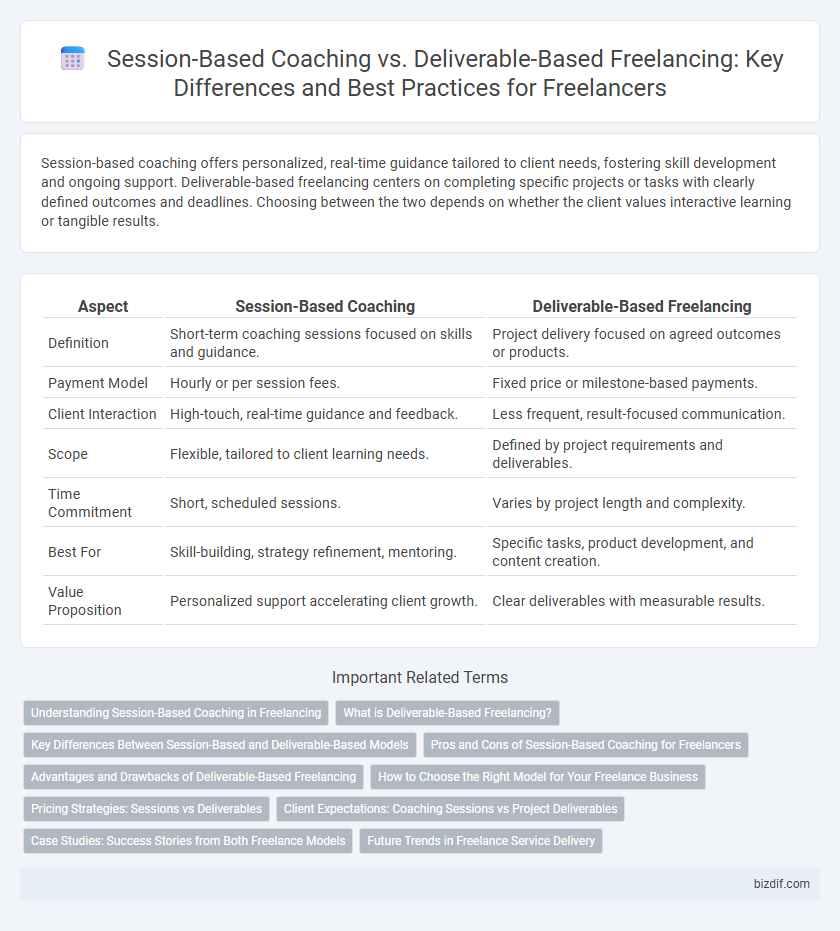Session-based coaching offers personalized, real-time guidance tailored to client needs, fostering skill development and ongoing support. Deliverable-based freelancing centers on completing specific projects or tasks with clearly defined outcomes and deadlines. Choosing between the two depends on whether the client values interactive learning or tangible results.
Table of Comparison
| Aspect | Session-Based Coaching | Deliverable-Based Freelancing |
|---|---|---|
| Definition | Short-term coaching sessions focused on skills and guidance. | Project delivery focused on agreed outcomes or products. |
| Payment Model | Hourly or per session fees. | Fixed price or milestone-based payments. |
| Client Interaction | High-touch, real-time guidance and feedback. | Less frequent, result-focused communication. |
| Scope | Flexible, tailored to client learning needs. | Defined by project requirements and deliverables. |
| Time Commitment | Short, scheduled sessions. | Varies by project length and complexity. |
| Best For | Skill-building, strategy refinement, mentoring. | Specific tasks, product development, and content creation. |
| Value Proposition | Personalized support accelerating client growth. | Clear deliverables with measurable results. |
Understanding Session-Based Coaching in Freelancing
Session-based coaching in freelancing revolves around providing real-time guidance and expertise through scheduled interactions, enabling clients to gain insights and solve problems dynamically. This approach emphasizes building a collaborative relationship where the freelancer adapts to the client's evolving needs during each session, fostering skill development and strategic growth. Unlike deliverable-based freelancing, session-based coaching prioritizes personalized support and ongoing communication over fixed outputs.
What is Deliverable-Based Freelancing?
Deliverable-based freelancing involves completing specific tasks or projects with clearly defined outputs and deadlines, ensuring clients receive tangible results such as reports, designs, or code. This model emphasizes measurable deliverables over the time spent, enabling freelancers to manage multiple projects and clients efficiently. Payment is typically tied to the successful submission of these deliverables rather than hourly work or session attendance.
Key Differences Between Session-Based and Deliverable-Based Models
Session-based coaching emphasizes real-time guidance through structured interactions, fostering client skill development and personalized feedback, while deliverable-based freelancing focuses on completing specific projects or tasks with defined outcomes and deadlines. Session-based models prioritize ongoing client engagement and adaptability, whereas deliverable-based freelancing hinges on tangible results and fixed deliverables. Pricing structures differ significantly, with session-based coaching often charged hourly or per session, in contrast to fixed or milestone-based payments common in deliverable-focused projects.
Pros and Cons of Session-Based Coaching for Freelancers
Session-based coaching offers freelancers personalized, flexible support tailored to their specific challenges, enhancing skill development and problem-solving abilities in real time. However, the time-sensitive nature may limit scalability and consistent income compared to deliverable-based projects, and some clients may prefer tangible outputs over ongoing sessions. This model fosters deeper client relationships and continuous improvement but requires strong communication skills and commitment to regular engagement.
Advantages and Drawbacks of Deliverable-Based Freelancing
Deliverable-based freelancing offers clear project scopes and payment terms, making it easier to manage client expectations and cash flow, but it can lead to scope creep without strict boundaries. This model allows freelancers to focus on tangible outputs, enhancing efficiency and portfolio development, yet it often results in unpredictable workloads and pressure to meet strict deadlines. Clients may prioritize results over process, potentially limiting creative freedom and reducing opportunities for comprehensive feedback.
How to Choose the Right Model for Your Freelance Business
Choosing between session-based coaching and deliverable-based freelancing depends on your expertise, client needs, and income goals. Session-based coaching suits freelancers who excel in real-time knowledge sharing and building long-term client relationships, often resulting in higher client retention and recurring revenue. Deliverable-based freelancing fits those who prefer project-specific tasks with clear outcomes, offering straightforward payment structures but requiring constant client acquisition to maintain steady income.
Pricing Strategies: Sessions vs Deliverables
Session-based coaching pricing often relies on hourly or package rates that reflect the time and expertise invested, fostering ongoing client relationships and predictable revenue. Deliverable-based freelancing pricing hinges on clear project scopes with fixed fees tied to specific outputs, emphasizing value and efficiency for both freelancer and client. Selecting between these strategies depends on the nature of the service, client preferences, and the desired balance between flexibility and defined outcomes.
Client Expectations: Coaching Sessions vs Project Deliverables
Session-based coaching in freelancing emphasizes continuous client engagement and personalized guidance, fostering skill development and strategic problem-solving through scheduled interactions. Deliverable-based freelancing prioritizes clear, tangible project outcomes with defined deadlines, aligning client expectations around specific outputs rather than ongoing collaboration. Clients seeking adaptive support value coaching sessions, while those focused on final products prefer deliverable-based agreements for predictable results.
Case Studies: Success Stories from Both Freelance Models
Case studies reveal that session-based coaching freelancers often achieve higher client retention rates by providing personalized guidance and real-time problem-solving, boosting overall client satisfaction and long-term growth. Deliverable-based freelancers highlight success in project efficiency and clear milestone achievements, resulting in streamlined workflows and predictable income patterns. Both models demonstrate unique strengths, with coaching fostering deeper client relationships and deliverable-based freelancing excelling in task-specific outcomes.
Future Trends in Freelance Service Delivery
Session-based coaching emphasizes real-time interaction and personalized guidance, fostering ongoing client development. Deliverable-based freelancing focuses on specific outputs and project completion, streamlining workflows and cost predictability. Future trends indicate a hybrid model integrating coaching sessions with clear deliverables, leveraging technology platforms to enhance client engagement and scalability in freelance service delivery.
Session-Based Coaching vs Deliverable-Based Freelancing Infographic

 bizdif.com
bizdif.com